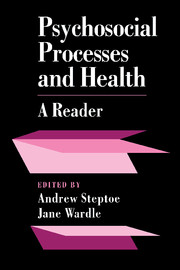Book contents
- Frontmatter
- Contents
- Preface
- Section 1 Life stress, social support and health
- Section 2 Psychophysiological processes in disease
- Pain mechanisms: a new theory
- Effects of coping behavior on gastric lesions in rats as a function of the complexity of coping tasks
- Social stress and atherosclerosis in normocholesterolemic monkeys
- Mental stress and the induction of silent myocardial ischemia in patients with coronary artery disease
- Depressed lymphocyte function after bereavement
- Psychological stress and susceptibility to the common cold
- Section 3 Personality, behaviour patterns and health
- Section 4 Health practices and the modification of health risk behaviour
- Section 5 Coping with illness and disability
- Section 6 Behavioural interventions in medicine
- Index
Psychological stress and susceptibility to the common cold
from Section 2 - Psychophysiological processes in disease
Published online by Cambridge University Press: 05 August 2016
- Frontmatter
- Contents
- Preface
- Section 1 Life stress, social support and health
- Section 2 Psychophysiological processes in disease
- Pain mechanisms: a new theory
- Effects of coping behavior on gastric lesions in rats as a function of the complexity of coping tasks
- Social stress and atherosclerosis in normocholesterolemic monkeys
- Mental stress and the induction of silent myocardial ischemia in patients with coronary artery disease
- Depressed lymphocyte function after bereavement
- Psychological stress and susceptibility to the common cold
- Section 3 Personality, behaviour patterns and health
- Section 4 Health practices and the modification of health risk behaviour
- Section 5 Coping with illness and disability
- Section 6 Behavioural interventions in medicine
- Index
Summary
Abstract
Background. It is not known whether psychological stress suppresses host resistance to infection. To investigate this issue, we prospectively studied the relation between psychological stress and the frequency of documented clinical colds among subjects intentionally exposed to respiratory viruses.
Methods. After completing questionnaires assessing degrees of psychological stress, 394 healthy subjects were given nasal drops containing one of five respiratory viruses (rhinovirus type 2, 9, or 14, respiratory syncytial virus, or coronavirus type 229E), and an additional 26 were given saline nasal drops. The subjects were then quarantined and monitored for the development of evidence of infection and symptoms. Clinical colds were defined as clinical symptoms in the presence of an infection verified by the isolation of virus or by an increase in the virus-specific antibody titer.
Results. The rates of both respiratory infection (P< 0.005) and clinical colds (P < 0.02) increased in a dose-response manner with increases in the degree of psychological stress. Infection rates ranged from approximately 74 percent to approximately 90 percent, according to levels of psychological stress, and the incidence of clinical colds ranged from approximately 27 percent to 47 percent. These effects were not altered when we controlled for age, sex, education, allergic status, weight, the season, the number of subjects housed together, the infectious status of subjects sharing the same housing, and virus-specific antibody status at base line (before challenge). Moreover, the associations observed were similar for all five challenge viruses. Several potential stress-illness mediators, including smoking, alcohol consumption, exercise, diet, quality of sleep, white-cell counts, and total immunoglobulin levels, did not explain the association between stress and illness. Similarly, controls for personality variables (self-esteem, personal control, and introversion-extraversion) failed to alter our findings.
Conclusions. Psychological stress was associated in a dose-response manner with an increased risk of acute infectious respiratory illness, and this risk was attributable to increased rates of infection rather than to an increased frequency of symptoms after infection. (N Engl J Med 1991; 325:606-12.)
Stressful life events are commonly believed to suppress host resistance to infection. When demands imposed by events exceed a person's ability to cope, a psychological stress response composed of negative cognitive and emotional states is elicited. Psychological stress, in turn, is thought to influence immune function through autonomic nerves innervating lymphoid tissue or hormone-mediated alteration of immune cells.
- Type
- Chapter
- Information
- Psychosocial Processes and HealthA Reader, pp. 171 - 188Publisher: Cambridge University PressPrint publication year: 1994
- 1
- Cited by

